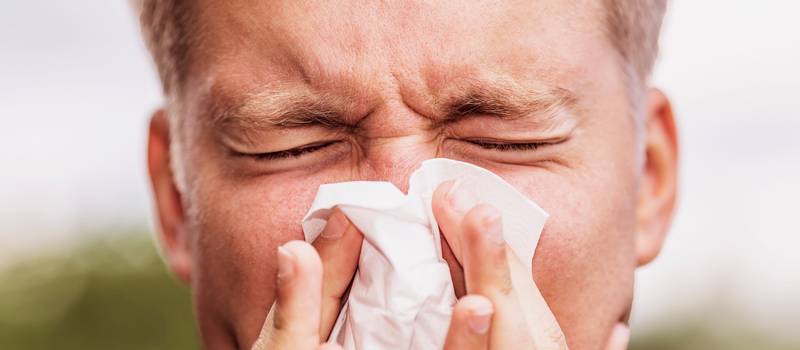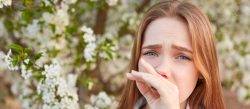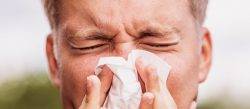Kids and allergies
Why do children develop allergies? Children with allergies have an immune system that is overactive. It has at some stage mistakenly…
Read MorePublished on May 23, 2022

Allergies are caused by an overreaction of the immune system to a particular substance, known as an allergen.
Allergic rhinitis is a condition in which allergies have caused inflammation of the lining of the nose. Although the symptoms resemble those of the common cold, they are not caused by an infection. Allergic rhinitis may be seasonal or perennial (year-round). The severity of allergic rhinitis is defined as mild or moderate/severe.
Seasonal allergic rhinitis, or hayfever, is caused by an allergy to pollens from grasses, flowers, weeds or trees. It can cause sudden, frequent attacks of sneezing, nasal discharge and congestion. These episodes may also be accompanied by eye symptoms, such as stinging, itchy and watering eyes.
While it typically develops in childhood, it is not unusual to develop hayfever as an adult. In fact, the median age to develop seasonal allergic rhinitis is 15 years.
Perennial allergic rhinitis is an allergy that persists all year round, such as a reaction to allergens such as house dust, animal dander or fungal spores.
Sneezing and a runny nose can often be the first sign of both a common cold and an allergy attack. Unlike the common cold, allergies are not caused by an infection. A mild cold may only last for a few days, but sometimes symptoms can last for up to two weeks. If symptoms persist for longer than this time period, they may be caused by an allergy or you may need to see your doctor.
The timing of symptoms may also help determine their cause. Unlike a infection, an allergy will cause symptoms that are persistent or that recur in certain situations. For example, seasonal hayfever will generally occur in the spring, summer or autumn, when the responsible plant releases its pollen into the air.
Hayfever symptoms are due to airborne pollens and allergens making their way into your respiratory system, nose or eyes and triggering a reaction that can inflame the area and cause hayfever symptoms.
There are several symptoms that might indicate you are suffering from a hayfever allergy. These include:
Pollen is a very fine powder produced by the male fertilising agent of flowering plants, which is used to fertilise other plants from the same species. These types of plants can cause pollen allergies (also known as Hayfever or Allergic Rhinitis) in people.
A healthcare professional will take a thorough medical history, physical exam and review your symptoms to diagnose your condition. There are skin allergy tests that can be taken to diagnose which allergen is causing your symptoms.
To reduce pollen exposure and the symptoms of hayfever:
Telfast® is a non-drowsy antihistamine that works to help reduce the symptoms of hayfever allergies. For those with persistent or severe hayfever, your pharmacist or general practitioner may recommend you a nasal steroid spray, in addition to an antihistamine treatment. Nasal steroid sprays can help to reduce inflammation in the nasal passage to help relieve symptoms.
If your symptoms are not being relieved by your current treatment, talk to your doctor or pharmacist for other options that may better suit your needs.
Always read the label and follow the directions for use.
Consult your GP or pharmacist about appropriate hayfever medication for your individual circumstances. Telfast should not be taken while pregnant unless specified by a GP or pharmacist.
Hayfever is a common condition that often develops in childhood. Sensitisation to indoor allergens (e.g. dust mites) can occur by the age of two, while sensitisation to outdoor allergens (e.g. grass pollen) can occur by the ages of three to five.
A healthy lifestyle can help you manage your allergy symptoms. So, while avoiding allergy triggers is important for managing symptoms, lifestyle choices may also play a part.
Always read the label and follow the directions for use
Learn about which Telfast product may be appropriate for you.
SEE THE PRODUCTS HEREMAT-AU-2102140. Nov 2021

Why do children develop allergies? Children with allergies have an immune system that is overactive. It has at some stage mistakenly…
Read More
Acute: Describes a disease or condition with a rapid onset, intense or severe symptoms and of brief duration. Allergen: Any…
Read More
What are allergies? Allergies are caused by an overreaction of the immune system to a particular substance, known as an…
Read MoreIf you’d like to know which product might be suitable for your needs, or if you have questions relating to any of our products, please fill in the form below. We’d love to hear from you. To speak with a team member or report an adverse event, please call 1800 818 806 within Australia.
Thank you for your submission. A representative will be in contact shortly.
Submit